Marketing Strategies for Hospitality Sector
VerifiedAdded on 2020/11/12
|12
|3223
|262
AI Summary
This assignment report highlights the essential role of marketing in the hospitality sector, which is a growing industry that requires various marketing techniques and strategies. The report discusses the importance of tools, advertisement campaigns, and personal judgement in supporting communication activities and boosting growth and development. It also provides references to relevant books and journals, including 'International Hospitality Industry' by Brotherton, 'Leisure Marketing' by Horner and Swarbrooke, and 'Sustainability in the Hospitality Industry' by Legrand et al.
Contribute Materials
Your contribution can guide someone’s learning journey. Share your
documents today.
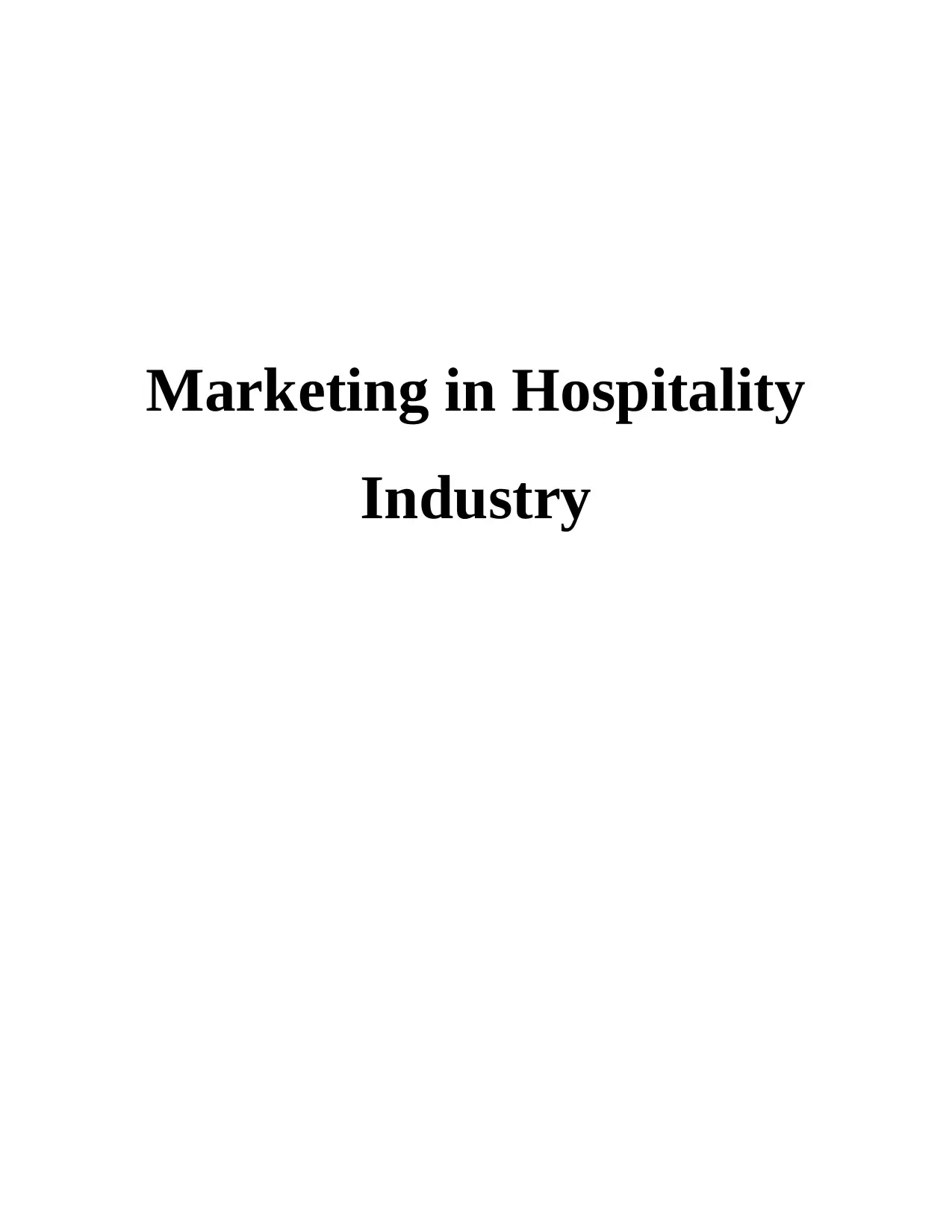
Marketing in Hospitality
Industry
Industry
Secure Best Marks with AI Grader
Need help grading? Try our AI Grader for instant feedback on your assignments.
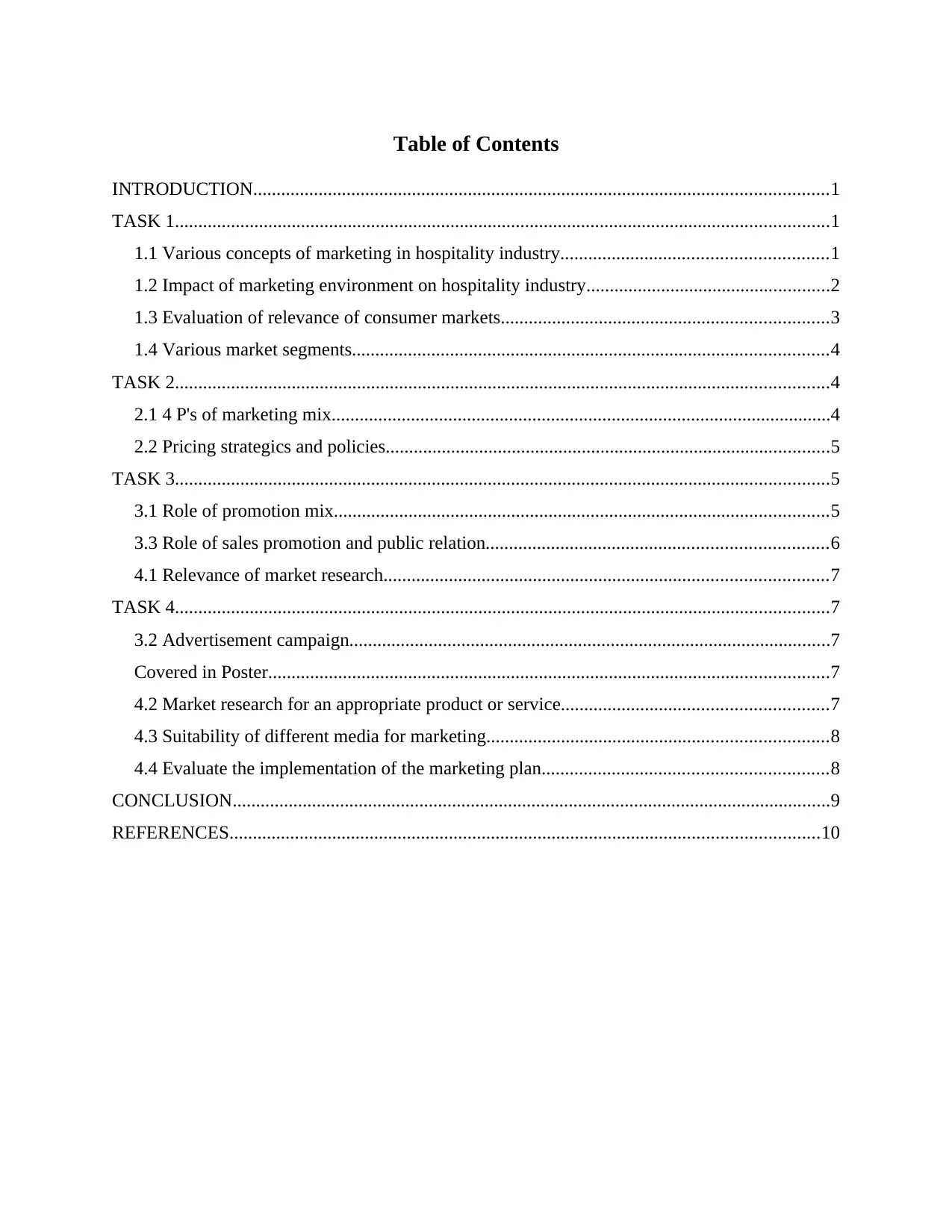
Table of Contents
INTRODUCTION...........................................................................................................................1
TASK 1............................................................................................................................................1
1.1 Various concepts of marketing in hospitality industry.........................................................1
1.2 Impact of marketing environment on hospitality industry....................................................2
1.3 Evaluation of relevance of consumer markets......................................................................3
1.4 Various market segments......................................................................................................4
TASK 2............................................................................................................................................4
2.1 4 P's of marketing mix...........................................................................................................4
2.2 Pricing strategics and policies...............................................................................................5
TASK 3............................................................................................................................................5
3.1 Role of promotion mix..........................................................................................................5
3.3 Role of sales promotion and public relation.........................................................................6
4.1 Relevance of market research...............................................................................................7
TASK 4............................................................................................................................................7
3.2 Advertisement campaign.......................................................................................................7
Covered in Poster........................................................................................................................7
4.2 Market research for an appropriate product or service.........................................................7
4.3 Suitability of different media for marketing.........................................................................8
4.4 Evaluate the implementation of the marketing plan.............................................................8
CONCLUSION................................................................................................................................9
REFERENCES..............................................................................................................................10
INTRODUCTION...........................................................................................................................1
TASK 1............................................................................................................................................1
1.1 Various concepts of marketing in hospitality industry.........................................................1
1.2 Impact of marketing environment on hospitality industry....................................................2
1.3 Evaluation of relevance of consumer markets......................................................................3
1.4 Various market segments......................................................................................................4
TASK 2............................................................................................................................................4
2.1 4 P's of marketing mix...........................................................................................................4
2.2 Pricing strategics and policies...............................................................................................5
TASK 3............................................................................................................................................5
3.1 Role of promotion mix..........................................................................................................5
3.3 Role of sales promotion and public relation.........................................................................6
4.1 Relevance of market research...............................................................................................7
TASK 4............................................................................................................................................7
3.2 Advertisement campaign.......................................................................................................7
Covered in Poster........................................................................................................................7
4.2 Market research for an appropriate product or service.........................................................7
4.3 Suitability of different media for marketing.........................................................................8
4.4 Evaluate the implementation of the marketing plan.............................................................8
CONCLUSION................................................................................................................................9
REFERENCES..............................................................................................................................10
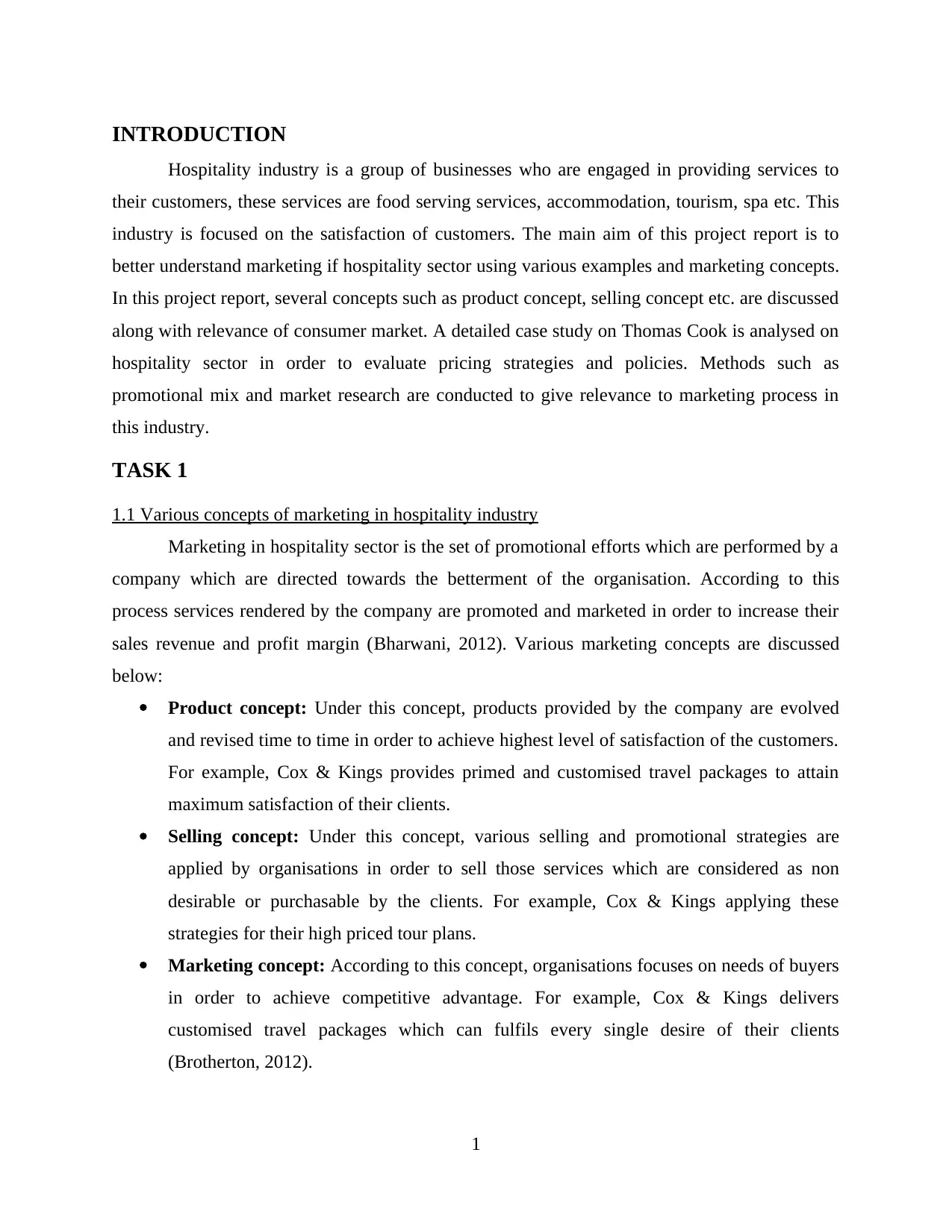
INTRODUCTION
Hospitality industry is a group of businesses who are engaged in providing services to
their customers, these services are food serving services, accommodation, tourism, spa etc. This
industry is focused on the satisfaction of customers. The main aim of this project report is to
better understand marketing if hospitality sector using various examples and marketing concepts.
In this project report, several concepts such as product concept, selling concept etc. are discussed
along with relevance of consumer market. A detailed case study on Thomas Cook is analysed on
hospitality sector in order to evaluate pricing strategies and policies. Methods such as
promotional mix and market research are conducted to give relevance to marketing process in
this industry.
TASK 1
1.1 Various concepts of marketing in hospitality industry
Marketing in hospitality sector is the set of promotional efforts which are performed by a
company which are directed towards the betterment of the organisation. According to this
process services rendered by the company are promoted and marketed in order to increase their
sales revenue and profit margin (Bharwani, 2012). Various marketing concepts are discussed
below:
Product concept: Under this concept, products provided by the company are evolved
and revised time to time in order to achieve highest level of satisfaction of the customers.
For example, Cox & Kings provides primed and customised travel packages to attain
maximum satisfaction of their clients.
Selling concept: Under this concept, various selling and promotional strategies are
applied by organisations in order to sell those services which are considered as non
desirable or purchasable by the clients. For example, Cox & Kings applying these
strategies for their high priced tour plans.
Marketing concept: According to this concept, organisations focuses on needs of buyers
in order to achieve competitive advantage. For example, Cox & Kings delivers
customised travel packages which can fulfils every single desire of their clients
(Brotherton, 2012).
1
Hospitality industry is a group of businesses who are engaged in providing services to
their customers, these services are food serving services, accommodation, tourism, spa etc. This
industry is focused on the satisfaction of customers. The main aim of this project report is to
better understand marketing if hospitality sector using various examples and marketing concepts.
In this project report, several concepts such as product concept, selling concept etc. are discussed
along with relevance of consumer market. A detailed case study on Thomas Cook is analysed on
hospitality sector in order to evaluate pricing strategies and policies. Methods such as
promotional mix and market research are conducted to give relevance to marketing process in
this industry.
TASK 1
1.1 Various concepts of marketing in hospitality industry
Marketing in hospitality sector is the set of promotional efforts which are performed by a
company which are directed towards the betterment of the organisation. According to this
process services rendered by the company are promoted and marketed in order to increase their
sales revenue and profit margin (Bharwani, 2012). Various marketing concepts are discussed
below:
Product concept: Under this concept, products provided by the company are evolved
and revised time to time in order to achieve highest level of satisfaction of the customers.
For example, Cox & Kings provides primed and customised travel packages to attain
maximum satisfaction of their clients.
Selling concept: Under this concept, various selling and promotional strategies are
applied by organisations in order to sell those services which are considered as non
desirable or purchasable by the clients. For example, Cox & Kings applying these
strategies for their high priced tour plans.
Marketing concept: According to this concept, organisations focuses on needs of buyers
in order to achieve competitive advantage. For example, Cox & Kings delivers
customised travel packages which can fulfils every single desire of their clients
(Brotherton, 2012).
1
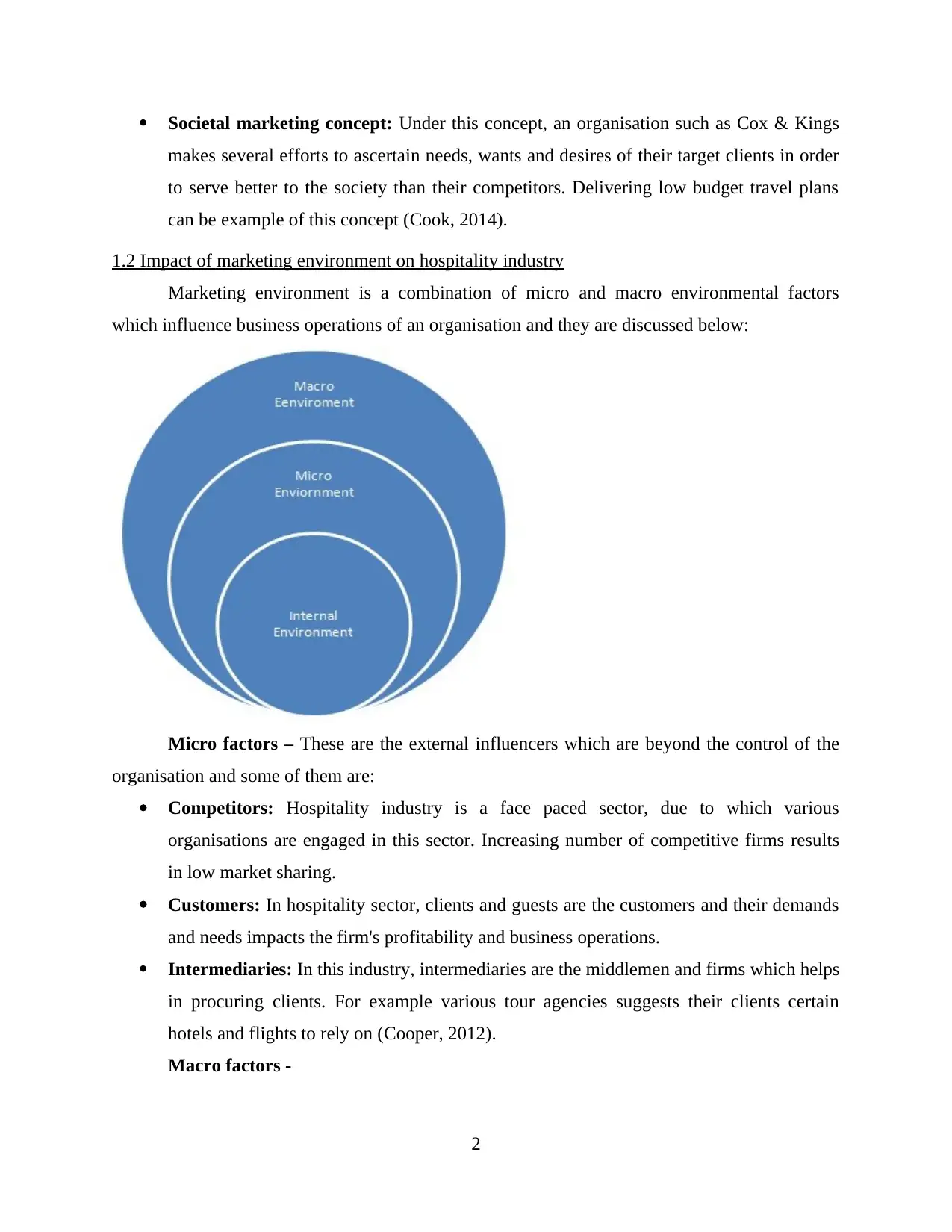
Societal marketing concept: Under this concept, an organisation such as Cox & Kings
makes several efforts to ascertain needs, wants and desires of their target clients in order
to serve better to the society than their competitors. Delivering low budget travel plans
can be example of this concept (Cook, 2014).
1.2 Impact of marketing environment on hospitality industry
Marketing environment is a combination of micro and macro environmental factors
which influence business operations of an organisation and they are discussed below:
Micro factors – These are the external influencers which are beyond the control of the
organisation and some of them are:
Competitors: Hospitality industry is a face paced sector, due to which various
organisations are engaged in this sector. Increasing number of competitive firms results
in low market sharing.
Customers: In hospitality sector, clients and guests are the customers and their demands
and needs impacts the firm's profitability and business operations.
Intermediaries: In this industry, intermediaries are the middlemen and firms which helps
in procuring clients. For example various tour agencies suggests their clients certain
hotels and flights to rely on (Cooper, 2012).
Macro factors -
2
makes several efforts to ascertain needs, wants and desires of their target clients in order
to serve better to the society than their competitors. Delivering low budget travel plans
can be example of this concept (Cook, 2014).
1.2 Impact of marketing environment on hospitality industry
Marketing environment is a combination of micro and macro environmental factors
which influence business operations of an organisation and they are discussed below:
Micro factors – These are the external influencers which are beyond the control of the
organisation and some of them are:
Competitors: Hospitality industry is a face paced sector, due to which various
organisations are engaged in this sector. Increasing number of competitive firms results
in low market sharing.
Customers: In hospitality sector, clients and guests are the customers and their demands
and needs impacts the firm's profitability and business operations.
Intermediaries: In this industry, intermediaries are the middlemen and firms which helps
in procuring clients. For example various tour agencies suggests their clients certain
hotels and flights to rely on (Cooper, 2012).
Macro factors -
2
Secure Best Marks with AI Grader
Need help grading? Try our AI Grader for instant feedback on your assignments.
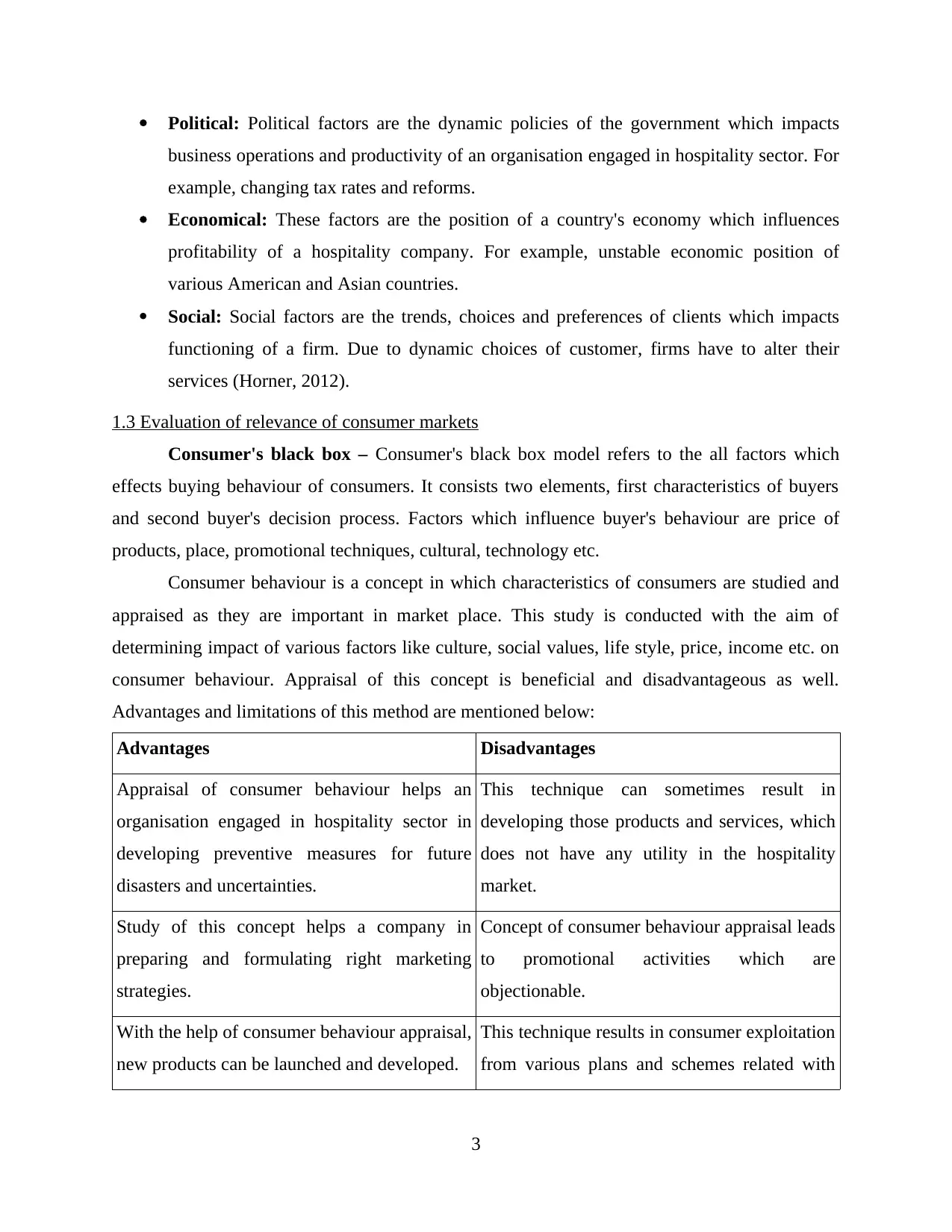
Political: Political factors are the dynamic policies of the government which impacts
business operations and productivity of an organisation engaged in hospitality sector. For
example, changing tax rates and reforms.
Economical: These factors are the position of a country's economy which influences
profitability of a hospitality company. For example, unstable economic position of
various American and Asian countries.
Social: Social factors are the trends, choices and preferences of clients which impacts
functioning of a firm. Due to dynamic choices of customer, firms have to alter their
services (Horner, 2012).
1.3 Evaluation of relevance of consumer markets
Consumer's black box – Consumer's black box model refers to the all factors which
effects buying behaviour of consumers. It consists two elements, first characteristics of buyers
and second buyer's decision process. Factors which influence buyer's behaviour are price of
products, place, promotional techniques, cultural, technology etc.
Consumer behaviour is a concept in which characteristics of consumers are studied and
appraised as they are important in market place. This study is conducted with the aim of
determining impact of various factors like culture, social values, life style, price, income etc. on
consumer behaviour. Appraisal of this concept is beneficial and disadvantageous as well.
Advantages and limitations of this method are mentioned below:
Advantages Disadvantages
Appraisal of consumer behaviour helps an
organisation engaged in hospitality sector in
developing preventive measures for future
disasters and uncertainties.
This technique can sometimes result in
developing those products and services, which
does not have any utility in the hospitality
market.
Study of this concept helps a company in
preparing and formulating right marketing
strategies.
Concept of consumer behaviour appraisal leads
to promotional activities which are
objectionable.
With the help of consumer behaviour appraisal,
new products can be launched and developed.
This technique results in consumer exploitation
from various plans and schemes related with
3
business operations and productivity of an organisation engaged in hospitality sector. For
example, changing tax rates and reforms.
Economical: These factors are the position of a country's economy which influences
profitability of a hospitality company. For example, unstable economic position of
various American and Asian countries.
Social: Social factors are the trends, choices and preferences of clients which impacts
functioning of a firm. Due to dynamic choices of customer, firms have to alter their
services (Horner, 2012).
1.3 Evaluation of relevance of consumer markets
Consumer's black box – Consumer's black box model refers to the all factors which
effects buying behaviour of consumers. It consists two elements, first characteristics of buyers
and second buyer's decision process. Factors which influence buyer's behaviour are price of
products, place, promotional techniques, cultural, technology etc.
Consumer behaviour is a concept in which characteristics of consumers are studied and
appraised as they are important in market place. This study is conducted with the aim of
determining impact of various factors like culture, social values, life style, price, income etc. on
consumer behaviour. Appraisal of this concept is beneficial and disadvantageous as well.
Advantages and limitations of this method are mentioned below:
Advantages Disadvantages
Appraisal of consumer behaviour helps an
organisation engaged in hospitality sector in
developing preventive measures for future
disasters and uncertainties.
This technique can sometimes result in
developing those products and services, which
does not have any utility in the hospitality
market.
Study of this concept helps a company in
preparing and formulating right marketing
strategies.
Concept of consumer behaviour appraisal leads
to promotional activities which are
objectionable.
With the help of consumer behaviour appraisal,
new products can be launched and developed.
This technique results in consumer exploitation
from various plans and schemes related with
3
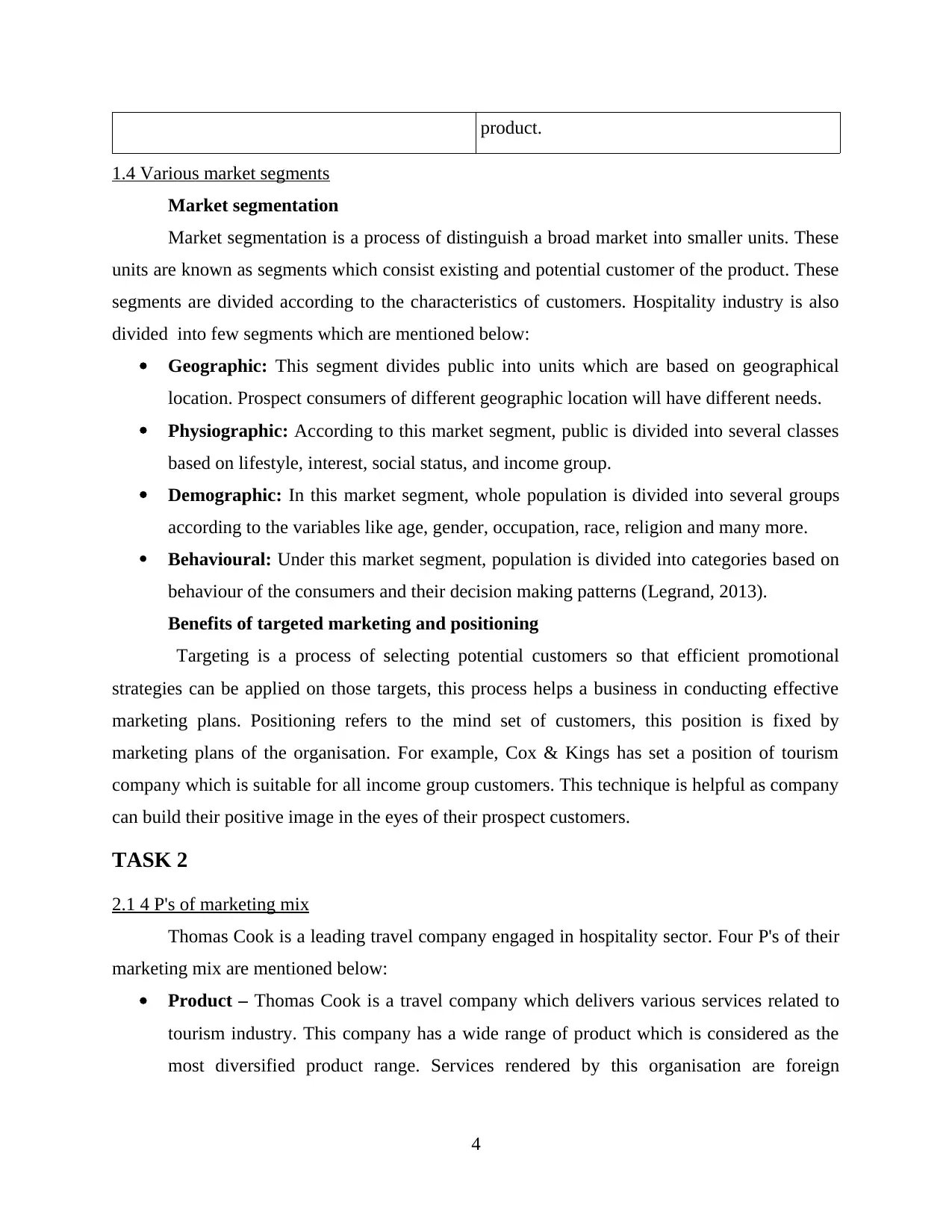
product.
1.4 Various market segments
Market segmentation
Market segmentation is a process of distinguish a broad market into smaller units. These
units are known as segments which consist existing and potential customer of the product. These
segments are divided according to the characteristics of customers. Hospitality industry is also
divided into few segments which are mentioned below:
Geographic: This segment divides public into units which are based on geographical
location. Prospect consumers of different geographic location will have different needs.
Physiographic: According to this market segment, public is divided into several classes
based on lifestyle, interest, social status, and income group.
Demographic: In this market segment, whole population is divided into several groups
according to the variables like age, gender, occupation, race, religion and many more.
Behavioural: Under this market segment, population is divided into categories based on
behaviour of the consumers and their decision making patterns (Legrand, 2013).
Benefits of targeted marketing and positioning
Targeting is a process of selecting potential customers so that efficient promotional
strategies can be applied on those targets, this process helps a business in conducting effective
marketing plans. Positioning refers to the mind set of customers, this position is fixed by
marketing plans of the organisation. For example, Cox & Kings has set a position of tourism
company which is suitable for all income group customers. This technique is helpful as company
can build their positive image in the eyes of their prospect customers.
TASK 2
2.1 4 P's of marketing mix
Thomas Cook is a leading travel company engaged in hospitality sector. Four P's of their
marketing mix are mentioned below:
Product – Thomas Cook is a travel company which delivers various services related to
tourism industry. This company has a wide range of product which is considered as the
most diversified product range. Services rendered by this organisation are foreign
4
1.4 Various market segments
Market segmentation
Market segmentation is a process of distinguish a broad market into smaller units. These
units are known as segments which consist existing and potential customer of the product. These
segments are divided according to the characteristics of customers. Hospitality industry is also
divided into few segments which are mentioned below:
Geographic: This segment divides public into units which are based on geographical
location. Prospect consumers of different geographic location will have different needs.
Physiographic: According to this market segment, public is divided into several classes
based on lifestyle, interest, social status, and income group.
Demographic: In this market segment, whole population is divided into several groups
according to the variables like age, gender, occupation, race, religion and many more.
Behavioural: Under this market segment, population is divided into categories based on
behaviour of the consumers and their decision making patterns (Legrand, 2013).
Benefits of targeted marketing and positioning
Targeting is a process of selecting potential customers so that efficient promotional
strategies can be applied on those targets, this process helps a business in conducting effective
marketing plans. Positioning refers to the mind set of customers, this position is fixed by
marketing plans of the organisation. For example, Cox & Kings has set a position of tourism
company which is suitable for all income group customers. This technique is helpful as company
can build their positive image in the eyes of their prospect customers.
TASK 2
2.1 4 P's of marketing mix
Thomas Cook is a leading travel company engaged in hospitality sector. Four P's of their
marketing mix are mentioned below:
Product – Thomas Cook is a travel company which delivers various services related to
tourism industry. This company has a wide range of product which is considered as the
most diversified product range. Services rendered by this organisation are foreign
4
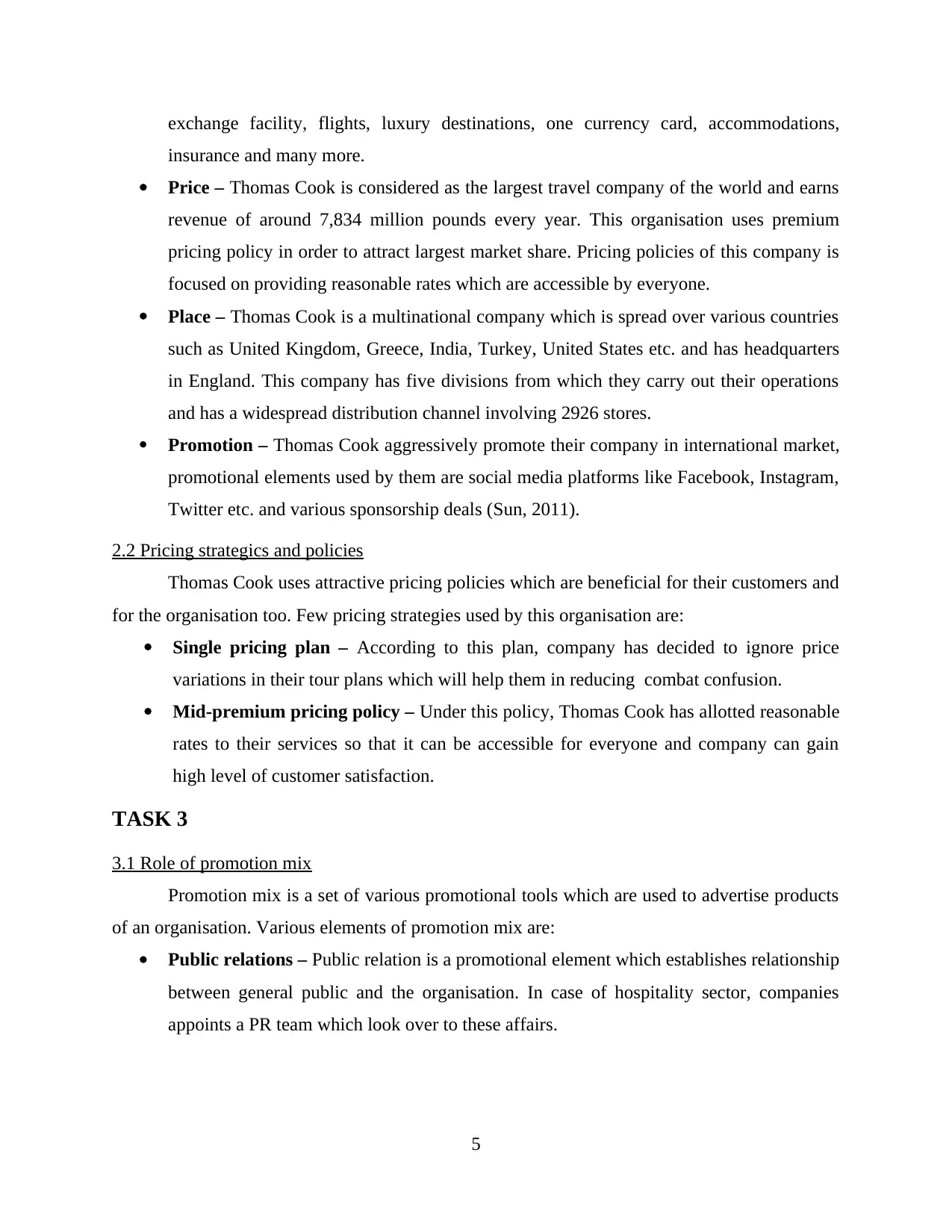
exchange facility, flights, luxury destinations, one currency card, accommodations,
insurance and many more.
Price – Thomas Cook is considered as the largest travel company of the world and earns
revenue of around 7,834 million pounds every year. This organisation uses premium
pricing policy in order to attract largest market share. Pricing policies of this company is
focused on providing reasonable rates which are accessible by everyone.
Place – Thomas Cook is a multinational company which is spread over various countries
such as United Kingdom, Greece, India, Turkey, United States etc. and has headquarters
in England. This company has five divisions from which they carry out their operations
and has a widespread distribution channel involving 2926 stores.
Promotion – Thomas Cook aggressively promote their company in international market,
promotional elements used by them are social media platforms like Facebook, Instagram,
Twitter etc. and various sponsorship deals (Sun, 2011).
2.2 Pricing strategics and policies
Thomas Cook uses attractive pricing policies which are beneficial for their customers and
for the organisation too. Few pricing strategies used by this organisation are:
Single pricing plan – According to this plan, company has decided to ignore price
variations in their tour plans which will help them in reducing combat confusion.
Mid-premium pricing policy – Under this policy, Thomas Cook has allotted reasonable
rates to their services so that it can be accessible for everyone and company can gain
high level of customer satisfaction.
TASK 3
3.1 Role of promotion mix
Promotion mix is a set of various promotional tools which are used to advertise products
of an organisation. Various elements of promotion mix are:
Public relations – Public relation is a promotional element which establishes relationship
between general public and the organisation. In case of hospitality sector, companies
appoints a PR team which look over to these affairs.
5
insurance and many more.
Price – Thomas Cook is considered as the largest travel company of the world and earns
revenue of around 7,834 million pounds every year. This organisation uses premium
pricing policy in order to attract largest market share. Pricing policies of this company is
focused on providing reasonable rates which are accessible by everyone.
Place – Thomas Cook is a multinational company which is spread over various countries
such as United Kingdom, Greece, India, Turkey, United States etc. and has headquarters
in England. This company has five divisions from which they carry out their operations
and has a widespread distribution channel involving 2926 stores.
Promotion – Thomas Cook aggressively promote their company in international market,
promotional elements used by them are social media platforms like Facebook, Instagram,
Twitter etc. and various sponsorship deals (Sun, 2011).
2.2 Pricing strategics and policies
Thomas Cook uses attractive pricing policies which are beneficial for their customers and
for the organisation too. Few pricing strategies used by this organisation are:
Single pricing plan – According to this plan, company has decided to ignore price
variations in their tour plans which will help them in reducing combat confusion.
Mid-premium pricing policy – Under this policy, Thomas Cook has allotted reasonable
rates to their services so that it can be accessible for everyone and company can gain
high level of customer satisfaction.
TASK 3
3.1 Role of promotion mix
Promotion mix is a set of various promotional tools which are used to advertise products
of an organisation. Various elements of promotion mix are:
Public relations – Public relation is a promotional element which establishes relationship
between general public and the organisation. In case of hospitality sector, companies
appoints a PR team which look over to these affairs.
5
Paraphrase This Document
Need a fresh take? Get an instant paraphrase of this document with our AI Paraphraser
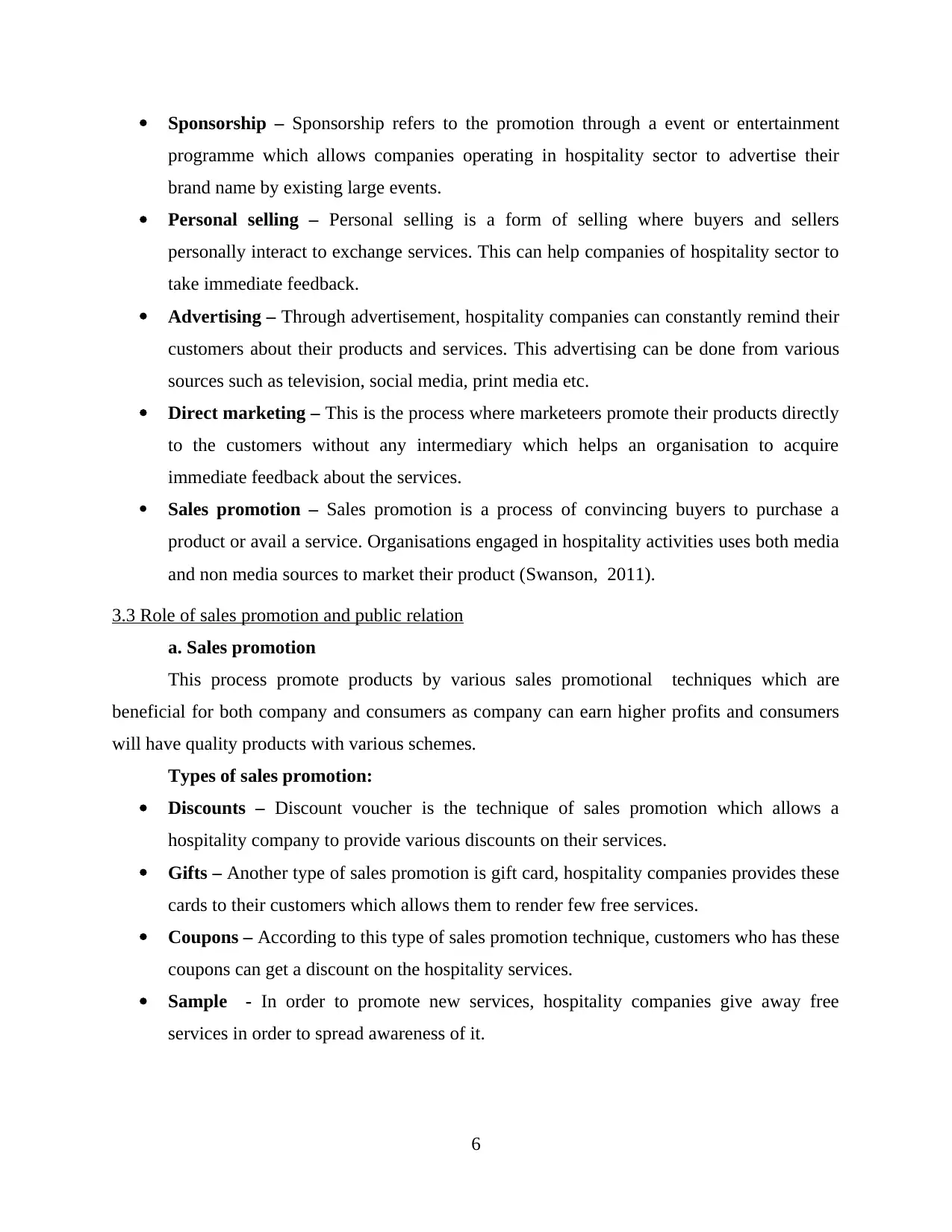
Sponsorship – Sponsorship refers to the promotion through a event or entertainment
programme which allows companies operating in hospitality sector to advertise their
brand name by existing large events.
Personal selling – Personal selling is a form of selling where buyers and sellers
personally interact to exchange services. This can help companies of hospitality sector to
take immediate feedback.
Advertising – Through advertisement, hospitality companies can constantly remind their
customers about their products and services. This advertising can be done from various
sources such as television, social media, print media etc.
Direct marketing – This is the process where marketeers promote their products directly
to the customers without any intermediary which helps an organisation to acquire
immediate feedback about the services.
Sales promotion – Sales promotion is a process of convincing buyers to purchase a
product or avail a service. Organisations engaged in hospitality activities uses both media
and non media sources to market their product (Swanson, 2011).
3.3 Role of sales promotion and public relation
a. Sales promotion
This process promote products by various sales promotional techniques which are
beneficial for both company and consumers as company can earn higher profits and consumers
will have quality products with various schemes.
Types of sales promotion:
Discounts – Discount voucher is the technique of sales promotion which allows a
hospitality company to provide various discounts on their services.
Gifts – Another type of sales promotion is gift card, hospitality companies provides these
cards to their customers which allows them to render few free services.
Coupons – According to this type of sales promotion technique, customers who has these
coupons can get a discount on the hospitality services.
Sample - In order to promote new services, hospitality companies give away free
services in order to spread awareness of it.
6
programme which allows companies operating in hospitality sector to advertise their
brand name by existing large events.
Personal selling – Personal selling is a form of selling where buyers and sellers
personally interact to exchange services. This can help companies of hospitality sector to
take immediate feedback.
Advertising – Through advertisement, hospitality companies can constantly remind their
customers about their products and services. This advertising can be done from various
sources such as television, social media, print media etc.
Direct marketing – This is the process where marketeers promote their products directly
to the customers without any intermediary which helps an organisation to acquire
immediate feedback about the services.
Sales promotion – Sales promotion is a process of convincing buyers to purchase a
product or avail a service. Organisations engaged in hospitality activities uses both media
and non media sources to market their product (Swanson, 2011).
3.3 Role of sales promotion and public relation
a. Sales promotion
This process promote products by various sales promotional techniques which are
beneficial for both company and consumers as company can earn higher profits and consumers
will have quality products with various schemes.
Types of sales promotion:
Discounts – Discount voucher is the technique of sales promotion which allows a
hospitality company to provide various discounts on their services.
Gifts – Another type of sales promotion is gift card, hospitality companies provides these
cards to their customers which allows them to render few free services.
Coupons – According to this type of sales promotion technique, customers who has these
coupons can get a discount on the hospitality services.
Sample - In order to promote new services, hospitality companies give away free
services in order to spread awareness of it.
6

Contests – According to this sales promotion technique, organisations engaged in
hospitality sector conduct various contents in order to give away free services and
promote their brand (Wang, 2014).
b. Public relations
A company can use public relations in various ways which are mentioned below:
By attending public events, a company can promote their products.
A organisation engaged in hospitality sector can communicate with public through press
releases and can convey information about their new services.
According to current scenario, blogging is considered as an effective way of maintaining
public relations.
Besides blogging, social media platform can also help an organisation of hospitality
industry to establish strong public relations.
Another way of PR is publishing newsletters which can help in communicating position
of the company in current market situation.
4.1 Relevance of market research
Market research is a series of activities which are concerned with analyses of data about
target public and competition. This activity is a continuous process, various relevance of this
procedure are discussed below:
Market research helps an organisation engaged in hospitality sector in identifying
opportunities available in the market place.
Market research helps a hospitality company like Cox & Kings to measure and determine
their position in the market which is called self assessment.
This concept helps an organisation to identify various issues and threats which can
influence their business functioning and performance.
This process also helps in minimising risks which are involved in various business
operations.
7
hospitality sector conduct various contents in order to give away free services and
promote their brand (Wang, 2014).
b. Public relations
A company can use public relations in various ways which are mentioned below:
By attending public events, a company can promote their products.
A organisation engaged in hospitality sector can communicate with public through press
releases and can convey information about their new services.
According to current scenario, blogging is considered as an effective way of maintaining
public relations.
Besides blogging, social media platform can also help an organisation of hospitality
industry to establish strong public relations.
Another way of PR is publishing newsletters which can help in communicating position
of the company in current market situation.
4.1 Relevance of market research
Market research is a series of activities which are concerned with analyses of data about
target public and competition. This activity is a continuous process, various relevance of this
procedure are discussed below:
Market research helps an organisation engaged in hospitality sector in identifying
opportunities available in the market place.
Market research helps a hospitality company like Cox & Kings to measure and determine
their position in the market which is called self assessment.
This concept helps an organisation to identify various issues and threats which can
influence their business functioning and performance.
This process also helps in minimising risks which are involved in various business
operations.
7
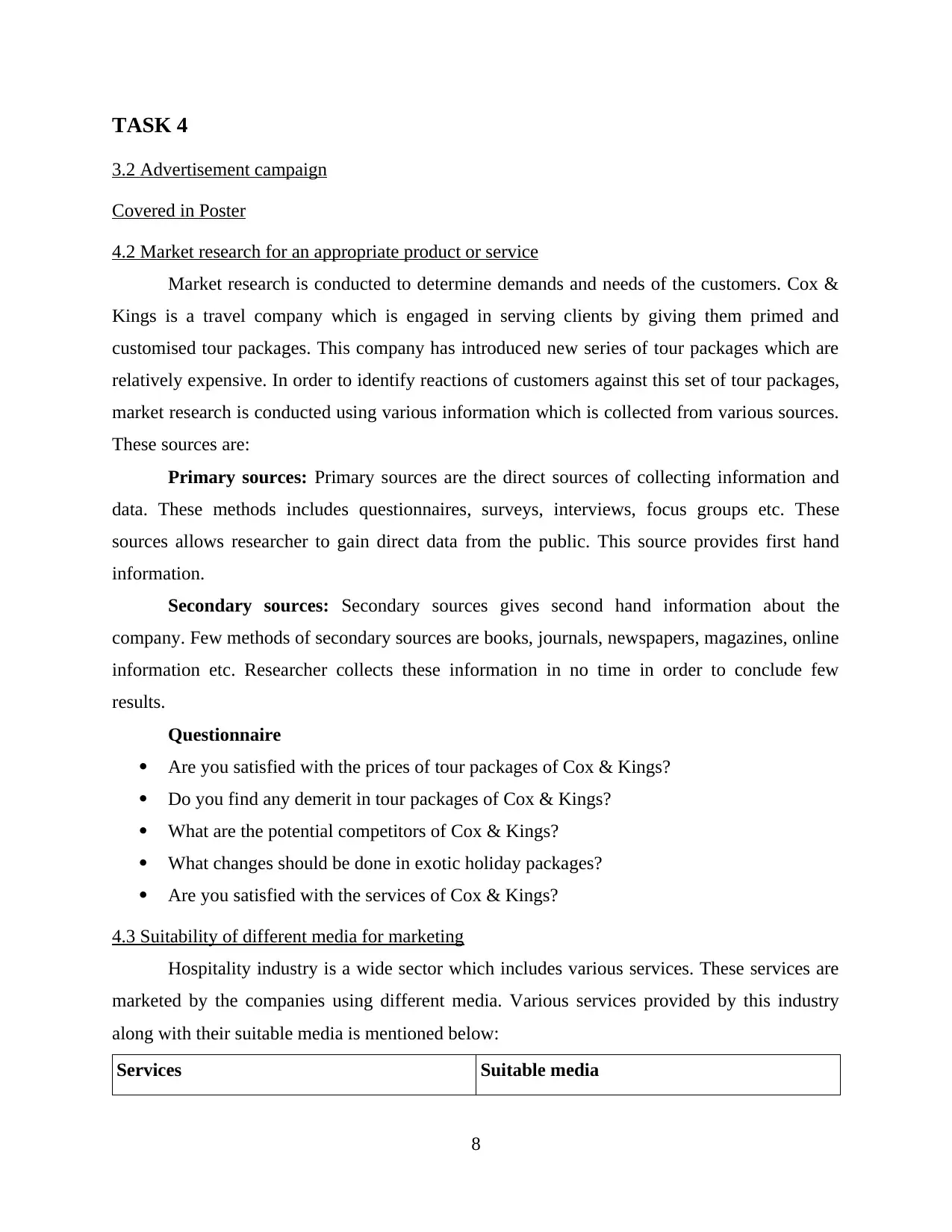
TASK 4
3.2 Advertisement campaign
Covered in Poster
4.2 Market research for an appropriate product or service
Market research is conducted to determine demands and needs of the customers. Cox &
Kings is a travel company which is engaged in serving clients by giving them primed and
customised tour packages. This company has introduced new series of tour packages which are
relatively expensive. In order to identify reactions of customers against this set of tour packages,
market research is conducted using various information which is collected from various sources.
These sources are:
Primary sources: Primary sources are the direct sources of collecting information and
data. These methods includes questionnaires, surveys, interviews, focus groups etc. These
sources allows researcher to gain direct data from the public. This source provides first hand
information.
Secondary sources: Secondary sources gives second hand information about the
company. Few methods of secondary sources are books, journals, newspapers, magazines, online
information etc. Researcher collects these information in no time in order to conclude few
results.
Questionnaire
Are you satisfied with the prices of tour packages of Cox & Kings?
Do you find any demerit in tour packages of Cox & Kings?
What are the potential competitors of Cox & Kings?
What changes should be done in exotic holiday packages?
Are you satisfied with the services of Cox & Kings?
4.3 Suitability of different media for marketing
Hospitality industry is a wide sector which includes various services. These services are
marketed by the companies using different media. Various services provided by this industry
along with their suitable media is mentioned below:
Services Suitable media
8
3.2 Advertisement campaign
Covered in Poster
4.2 Market research for an appropriate product or service
Market research is conducted to determine demands and needs of the customers. Cox &
Kings is a travel company which is engaged in serving clients by giving them primed and
customised tour packages. This company has introduced new series of tour packages which are
relatively expensive. In order to identify reactions of customers against this set of tour packages,
market research is conducted using various information which is collected from various sources.
These sources are:
Primary sources: Primary sources are the direct sources of collecting information and
data. These methods includes questionnaires, surveys, interviews, focus groups etc. These
sources allows researcher to gain direct data from the public. This source provides first hand
information.
Secondary sources: Secondary sources gives second hand information about the
company. Few methods of secondary sources are books, journals, newspapers, magazines, online
information etc. Researcher collects these information in no time in order to conclude few
results.
Questionnaire
Are you satisfied with the prices of tour packages of Cox & Kings?
Do you find any demerit in tour packages of Cox & Kings?
What are the potential competitors of Cox & Kings?
What changes should be done in exotic holiday packages?
Are you satisfied with the services of Cox & Kings?
4.3 Suitability of different media for marketing
Hospitality industry is a wide sector which includes various services. These services are
marketed by the companies using different media. Various services provided by this industry
along with their suitable media is mentioned below:
Services Suitable media
8
Secure Best Marks with AI Grader
Need help grading? Try our AI Grader for instant feedback on your assignments.
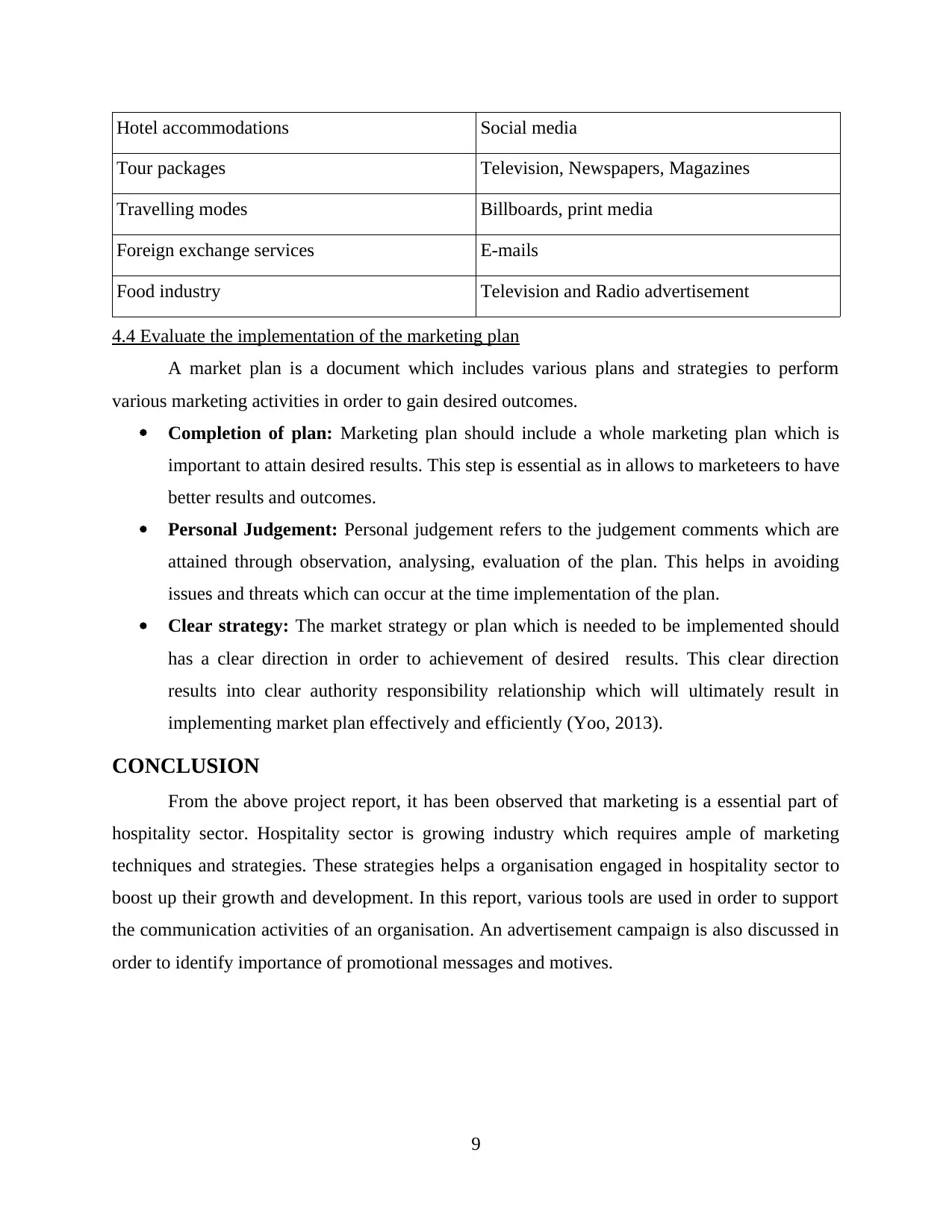
Hotel accommodations Social media
Tour packages Television, Newspapers, Magazines
Travelling modes Billboards, print media
Foreign exchange services E-mails
Food industry Television and Radio advertisement
4.4 Evaluate the implementation of the marketing plan
A market plan is a document which includes various plans and strategies to perform
various marketing activities in order to gain desired outcomes.
Completion of plan: Marketing plan should include a whole marketing plan which is
important to attain desired results. This step is essential as in allows to marketeers to have
better results and outcomes.
Personal Judgement: Personal judgement refers to the judgement comments which are
attained through observation, analysing, evaluation of the plan. This helps in avoiding
issues and threats which can occur at the time implementation of the plan.
Clear strategy: The market strategy or plan which is needed to be implemented should
has a clear direction in order to achievement of desired results. This clear direction
results into clear authority responsibility relationship which will ultimately result in
implementing market plan effectively and efficiently (Yoo, 2013).
CONCLUSION
From the above project report, it has been observed that marketing is a essential part of
hospitality sector. Hospitality sector is growing industry which requires ample of marketing
techniques and strategies. These strategies helps a organisation engaged in hospitality sector to
boost up their growth and development. In this report, various tools are used in order to support
the communication activities of an organisation. An advertisement campaign is also discussed in
order to identify importance of promotional messages and motives.
9
Tour packages Television, Newspapers, Magazines
Travelling modes Billboards, print media
Foreign exchange services E-mails
Food industry Television and Radio advertisement
4.4 Evaluate the implementation of the marketing plan
A market plan is a document which includes various plans and strategies to perform
various marketing activities in order to gain desired outcomes.
Completion of plan: Marketing plan should include a whole marketing plan which is
important to attain desired results. This step is essential as in allows to marketeers to have
better results and outcomes.
Personal Judgement: Personal judgement refers to the judgement comments which are
attained through observation, analysing, evaluation of the plan. This helps in avoiding
issues and threats which can occur at the time implementation of the plan.
Clear strategy: The market strategy or plan which is needed to be implemented should
has a clear direction in order to achievement of desired results. This clear direction
results into clear authority responsibility relationship which will ultimately result in
implementing market plan effectively and efficiently (Yoo, 2013).
CONCLUSION
From the above project report, it has been observed that marketing is a essential part of
hospitality sector. Hospitality sector is growing industry which requires ample of marketing
techniques and strategies. These strategies helps a organisation engaged in hospitality sector to
boost up their growth and development. In this report, various tools are used in order to support
the communication activities of an organisation. An advertisement campaign is also discussed in
order to identify importance of promotional messages and motives.
9
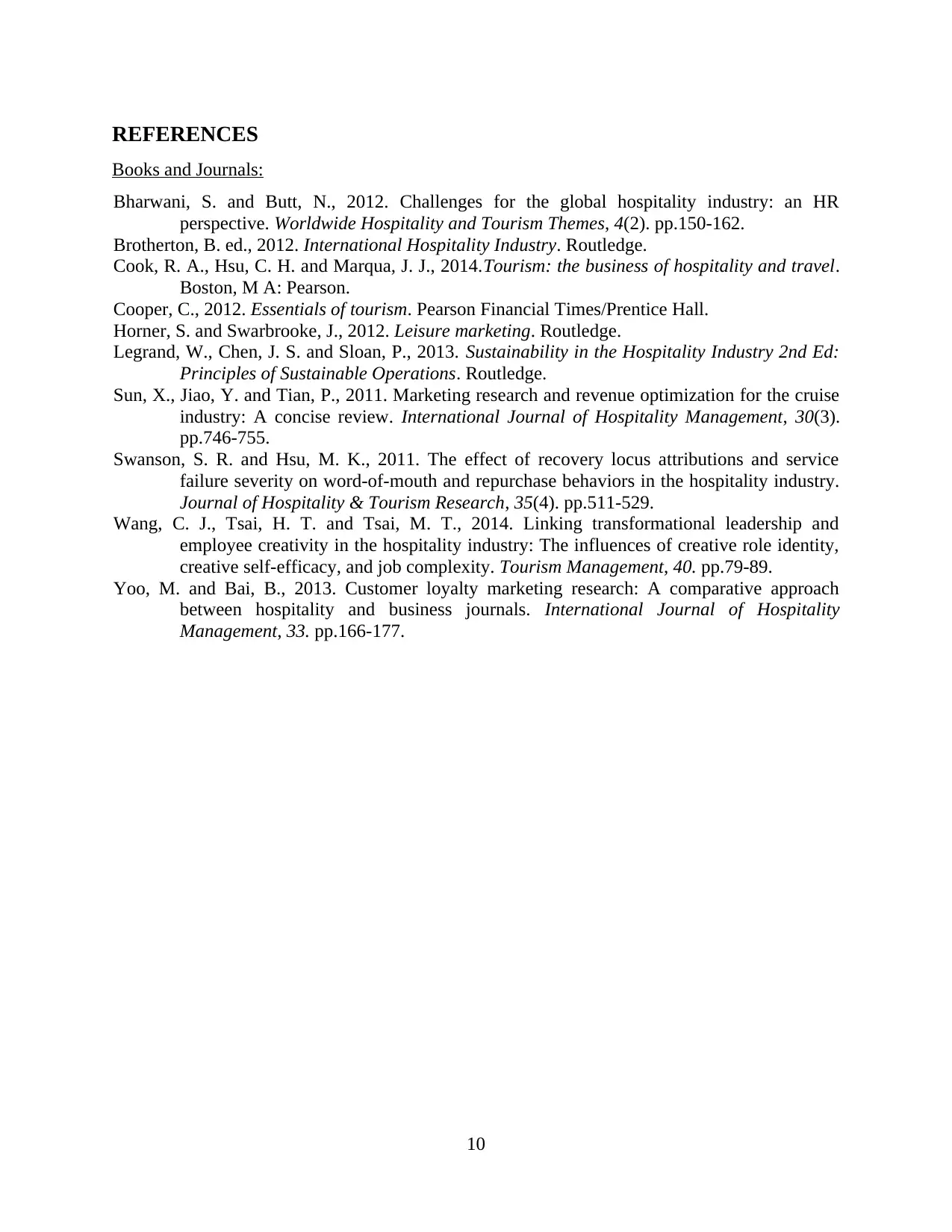
REFERENCES
Books and Journals:
Bharwani, S. and Butt, N., 2012. Challenges for the global hospitality industry: an HR
perspective. Worldwide Hospitality and Tourism Themes, 4(2). pp.150-162.
Brotherton, B. ed., 2012. International Hospitality Industry. Routledge.
Cook, R. A., Hsu, C. H. and Marqua, J. J., 2014.Tourism: the business of hospitality and travel.
Boston, M A: Pearson.
Cooper, C., 2012. Essentials of tourism. Pearson Financial Times/Prentice Hall.
Horner, S. and Swarbrooke, J., 2012. Leisure marketing. Routledge.
Legrand, W., Chen, J. S. and Sloan, P., 2013. Sustainability in the Hospitality Industry 2nd Ed:
Principles of Sustainable Operations. Routledge.
Sun, X., Jiao, Y. and Tian, P., 2011. Marketing research and revenue optimization for the cruise
industry: A concise review. International Journal of Hospitality Management, 30(3).
pp.746-755.
Swanson, S. R. and Hsu, M. K., 2011. The effect of recovery locus attributions and service
failure severity on word-of-mouth and repurchase behaviors in the hospitality industry.
Journal of Hospitality & Tourism Research, 35(4). pp.511-529.
Wang, C. J., Tsai, H. T. and Tsai, M. T., 2014. Linking transformational leadership and
employee creativity in the hospitality industry: The influences of creative role identity,
creative self-efficacy, and job complexity. Tourism Management, 40. pp.79-89.
Yoo, M. and Bai, B., 2013. Customer loyalty marketing research: A comparative approach
between hospitality and business journals. International Journal of Hospitality
Management, 33. pp.166-177.
10
Books and Journals:
Bharwani, S. and Butt, N., 2012. Challenges for the global hospitality industry: an HR
perspective. Worldwide Hospitality and Tourism Themes, 4(2). pp.150-162.
Brotherton, B. ed., 2012. International Hospitality Industry. Routledge.
Cook, R. A., Hsu, C. H. and Marqua, J. J., 2014.Tourism: the business of hospitality and travel.
Boston, M A: Pearson.
Cooper, C., 2012. Essentials of tourism. Pearson Financial Times/Prentice Hall.
Horner, S. and Swarbrooke, J., 2012. Leisure marketing. Routledge.
Legrand, W., Chen, J. S. and Sloan, P., 2013. Sustainability in the Hospitality Industry 2nd Ed:
Principles of Sustainable Operations. Routledge.
Sun, X., Jiao, Y. and Tian, P., 2011. Marketing research and revenue optimization for the cruise
industry: A concise review. International Journal of Hospitality Management, 30(3).
pp.746-755.
Swanson, S. R. and Hsu, M. K., 2011. The effect of recovery locus attributions and service
failure severity on word-of-mouth and repurchase behaviors in the hospitality industry.
Journal of Hospitality & Tourism Research, 35(4). pp.511-529.
Wang, C. J., Tsai, H. T. and Tsai, M. T., 2014. Linking transformational leadership and
employee creativity in the hospitality industry: The influences of creative role identity,
creative self-efficacy, and job complexity. Tourism Management, 40. pp.79-89.
Yoo, M. and Bai, B., 2013. Customer loyalty marketing research: A comparative approach
between hospitality and business journals. International Journal of Hospitality
Management, 33. pp.166-177.
10
1 out of 12
Related Documents
Your All-in-One AI-Powered Toolkit for Academic Success.
+13062052269
info@desklib.com
Available 24*7 on WhatsApp / Email
![[object Object]](/_next/static/media/star-bottom.7253800d.svg)
Unlock your academic potential
© 2024 | Zucol Services PVT LTD | All rights reserved.





